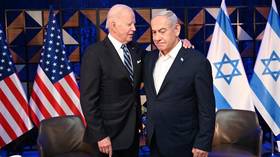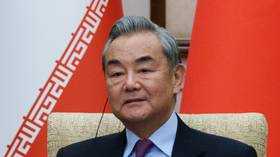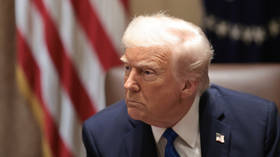Does Biden want Netanyahu gone?

Since the attack by militarized groups affiliated with the Palestinian movement Hamas on Israel on October 7, and the subsequent conflict in Gaza, special attention from the media has been drawn to the transformation of relations between Israeli Prime Minister Benjamin Netanyahu and the administration of US President Joseph Biden.
For experts analyzing the relationship between Netanyahu and the US authorities in historical retrospect, the current “cooling” did not come as a particular surprise. It would be useful to examine Netanyahu’s biography and political career, which is closely linked to the US.
American boy Ben Nitay
Benjamin Netanyahu, a dominant figure in Israeli politics, has had a career marked by resilience, controversy, and strategic acumen. As the longest-serving Israeli prime minister, Netanyahu’s political journey encompasses several terms in office, starting from 1996 to 1999 and then from 2009 onwards, with his leadership persisting through various coalitions and political climates.
Netanyahu was born in 1949 in Tel Aviv. His mother, Tzila Segal (1912–2000), was born in Jerusalem, and his father, Warsaw native Benzion Netanyahu (Mileikowsky; 1910–2012), was a historian specializing in the Jewish Golden Age in Spain. His paternal grandfather, Nathan Mileikowsky, was a rabbi and Zionist writer. The activities of his grandfather and father had a significant influence on the formation of Netanyahu’s nationalist ideas.
Between 1956 and 1958, and then from 1963 to 1967, his family lived in the US in Cheltenham Township, Pennsylvania, a suburb of Philadelphia, while his father, Benzion Netanyahu, taught at Dropsie College. After finishing high school in 1967, Netanyahu returned to Israel to enlist in the Israel Defense Forces (IDF), during which time he participated in a series of military operations and was wounded multiple times. In 1972, he completed his service and was discharged.
Netanyahu returned to the US at the end of that same year to study architecture at the Massachusetts Institute of Technology (MIT). After a brief return to Israel to participate in the Yom Kippur War, he went back to the US and, under the name Ben Nitay, earned a Bachelor of Science degree in architecture in February 1975, followed by a Master of Science degree from the Sloan School of Management at MIT in June 1976.
Simultaneously, he pursued a Ph.D. in political science until his studies were interrupted by the tragic news of his brother’s death in the same year, who had participated in the Entebbe raid, an anti-terrorist operation to free hostages taken on a flight from Tel Aviv to Paris in Uganda. Netanyahu’s close circle noted that the years of service in the IDF and then the death of his brother further hardened his position regarding the Palestinian issue.
After spending a few months in Israel, ‘Bibi’ returned to the US again and started working as an economic consultant for the Boston Consulting Group, where he met and befriended Mitt Romney, a Republican politician who would later serve as the Massachusetts governor, run against Barack Obama in the 2012 presidential election, and then become the junior senator from Utah in 2019.
Thus, it can be noted that before starting out in Israeli politics, Netanyahu had formed a significant career and connections in the US, which later determined the priority directions of his foreign policy.
The rise of a young politician
In 1978, Netanyahu returned to Israel. From 1978 to 1980, he led the Jonathan Netanyahu Anti-Terrorism Institute (named after his late brother), a non-governmental organization focused on the study of terrorism. From 1980 to 1982, he was the marketing director of Rim Industries in Jerusalem. During this period, he established his first connections with several Israeli politicians, including Moshe Arens. In 1982, Arens became the Israeli ambassador to the US and took Netanyahu with him to Washington as his deputy. From 1984 to 1988, Netanyahu served as the Israeli ambassador to the UN.
In 1988, Netanyahu returned to Israel and was elected to the Knesset as a member of the Likud party. He quickly rose through the party ranks, holding several ministerial positions, including deputy minister of foreign affairs.
In 1996, Netanyahu became the youngest person ever to hold the post of prime minister of Israel, after defeating Shimon Peres in highly competitive elections. His first term was marked by a tough stance on security issues and a cautious approach to the peace process with the Palestinians, despite signing the Hebron and Wye River agreements, which facilitated the implementation of the Oslo Accords.
After losing the 1999 election to Ehud Barak and taking a brief break from political leadership, Netanyahu returned with renewed force. He served as minister of foreign affairs and minister of finance in Ariel Sharon’s government, advocating for economic reforms and a hard line against the Palestinian intifada.
Netanyahu’s political resilience was fully demonstrated when he regained the Likud leadership and then the prime minister’s office in 2009. He then served several consecutive terms until June 2021, leading Israel through numerous challenges, including security threats, diplomatic isolation, and internal issues.
Netanyahu’s tenure has been characterized by a hard stance on security issues, particularly regarding Iran and its nuclear program, as well as a firm policy on combating terrorism. His government expanded Israeli settlements in the West Bank, leading to international criticism and tension with the Palestinians. Domestically, Netanyahu has championed a neoliberal economic policy, which spurred economic growth but also increased social inequality.
He faced numerous corruption charges, leading to widespread protests and calls for his resignation. Despite these challenges, Netanyahu has proven to be a political survivor, using his diplomatic skills, media experience, and a deep understanding of Israeli society to maintain his power.
He returned to lead the country’s government in December 2022. But this time, he decided to consolidate his power and initiated a legal reform at the beginning of 2023. This move has sparked significant controversy and protests in Israeli society. The reform involves a series of changes in the Israeli judicial system, which supporters explain as necessary to strengthen democratic principles and the balance of powers, while critics see it as a threat to democracy and the independence of the judicial system.
The cataclysms of Bibi’s relations with American authorities
Netanyahu’s relations with the US have been and remain a central aspect of his political career, reflecting a complex interplay of diplomacy, personal relations with US leaders, and at times, contentious political disagreements. These relationships have spanned the administrations of several US presidents, from Bill Clinton to Joe Biden, and have been characterized by both close cooperation and notable frictions.
Netanyahu’s first term as prime minister (1996-1999) coincided with the presidency of Bill Clinton. The two leaders had a rocky relationship, primarily due to disagreements over the peace process with the Palestinians and Israel’s settlement policy. The US sought to advance the Oslo Agreements and was often at odds with Netanyahu’s more security-oriented approach.
Relations between Netanyahu and the US improved during George W. Bush’s presidency, especially when Netanyahu was finance minister. The Bush administration’s strong stance on combating terrorism after the September 11 attacks aligned with Netanyahu’s security policies. Moreover, Bush’s support for Israel’s right to self-defense resonated with Netanyahu’s governmental and personal philosophy.
Significant tension rose during Barack Obama’s presidency. Firstly, Bibi was displeased with Washington’s support for protest movements and state coups in the Middle East during the Arab Spring. The Israeli prime minister was convinced that the revolutions would lead to power in Arab countries falling to proponents of radical Islamist movements, which in turn would lead to problems and conflicts with his country. However, in the White House, his concerns were disregarded, and the countries’ positions on this issue were diametrically opposed.
Another major point of contention was the nuclear deal with Iran (JCPOA), which Netanyahu vehemently opposed, claiming it would not prevent Tehran from developing nuclear weapons. Making an unprecedented move that underscored the depth of these disagreements, Netanyahu addressed the US Congress in 2015, criticizing the agreement – an action viewed as a direct challenge to Obama’s foreign policy and a breach of diplomatic protocol.
Donald Trump’s presidency marked a high point in US-Israel relations under Netanyahu. Trump’s decisions to recognize Jerusalem as Israel’s capital, move the US Embassy there, and acknowledge Israeli sovereignty over the Golan Heights were significant policy shifts that Netanyahu welcomed and celebrated.
This period was characterized by strong personal rapport between Netanyahu and Trump, with whom Bibi had become friends during his time as Israel’s ambassador to the UN in New York, as well as alignment on many policy issues, including a tough stance on Iran and shared skepticism toward traditional multilateral approaches to peace and security. It was under Trump that Netanyahu was able to normalize relations with several Arab countries through the Abraham Accords; it appeared that ties would be strong with Washington, and that relations with Arab countries would also improve.
Reviewing the history of Netanyahu’s relations with American authorities, one can easily discern a pattern. Bibi prefers and understands Republican presidents, whereas with Democrats, values and visions clearly clash. The logic of the relationships has not changed with the arrival of the experienced Democrat politician Joe Biden to the Oval Office.
Sworn “Friends”: Netanyahu and the Democrats
The relationship with the current Democratic administration did not start off well, as the new White House incumbent contemplated returning to the JCPOA with Iran, condemned the policy of illegal expansion of Israeli settlements on Palestinian territories, resumed funding for the UN’s Middle East agency for Palestinian refugees and works organization (UNRWA), and openly supported the two-state solution. Although Netanyahu and Biden had been closely acquainted for over four decades, their political views were very different.
After another escalation of relations between Israelis and Palestinians in May 2021 and a series of internal crises in Israel, Netanyahu was forced to “take a break,” and on June 13, 2021, the new government of Naftali Bennett and Yair Lapid was sworn in. The new authorities tried to mend relations with the Democrats, but the onset of Russia’s military operation in Ukraine prevented this. Washington demanded that everyone join the anti-Russian sanctions and isolate Moscow. Israel, like all of the US’ Middle Eastern partners in the region, did not agree.
But Netanyahu’s “break” was not long, and by December 2022, he had returned to Israel’s political Olympus, forming the most right-wing cabinet in decades. Things with Washington got even worse. Bibi and his government were condemned for their neutral stance on the Ukrainian conflict and, moreover, for the aforementioned judicial reform, which the US considered a “threat to democratic values and freedoms in Israel.” On March 20, 2023, Biden had a phone conversation with Netanyahu, during which he once again raised the significance of democracy for US-Israel relations and directly offered support in finding a compromise on the judicial reform issue.
But the crisis only deepened. After the suspension of the judicial reform, Biden told the media that Israel “can no longer go down this path” and expressed hope that the Israeli prime minister would abandon his plans. To top it off, the American president noted that he did not intend to invite Netanyahu to the White House “in the near future,” which aggravated him. The following day, Netanyahu responded: “Israel is a sovereign country that makes its decisions according to the will of its people, not based on pressure from abroad, including from the best friends.”
The events of October 7 did nothing to improve Netanyahu’s already tense relations with Washington. The Biden administration supported Israel, increasing its military presence in the region. The US House of Representatives approved a bill to allocate $14 billion in aid to Israel, and assistance in ammunition and weapons for Israel was also notably increased. However, the American authorities were extremely displeased with the IDF’s ground operation in Gaza. Multiple attempts to pressure Netanyahu and conclude a ceasefire agreement were unsuccessful. The Israeli PM disregarded all of the Biden administration’s “red lines.”
The trip of Netanyahu’s rival Benny Gantz to the US on March 4 and his negotiations with American officials were not coordinated with the PM. Many saw this as an attempt by the US to remove Netanyahu and replace him with Gantz, which only exacerbated the disagreements between the countries.
By April 7, the current conflict between Hamas and Israel will be six months old, but there’s still no resolution in sight. Washington, along with regional players Qatar and Egypt, tried to reach a ceasefire agreement before the start of the Muslim holy month of Ramadan, but all was in vain.
On March 7, in a conversation with Democratic Senator Michael Bennet, Biden said, “I told Bibi: we’re going to have a ‘come to Jesus’ meeting.” In an interview with MSNBC on March 9, he explained that in the south of his home state of Delaware, the expression “come to Jesus” is used to mean “a serious meeting.” “I’ve known Bibi for 50 years, and he understood what I meant,” the US leader stated, adding that “in my view, [Netanyahu’s] doing more harm to Israel than helping it, by making the rest of the world go against what Israel stands for. And I think that’s a big mistake.”
Netanyahu responded by saying: “I don’t know what the president meant, but if he meant that I am pursuing policies against the majority of the Israeli public and that it harms Israel’s interests, then he is mistaken on both counts.” “We will go there. We will not back down from this. You know, I also have a ‘red line.’ You know what that ‘red line’ is? To ensure that October 7th never happens again. It will never happen again,” Bibi added, referring to the operation in the Palestinian city of Rafah, which Washington opposes.
In summary, it can be noted that indeed, Netanyahu’s relations with the Biden administration are deteriorating against the backdrop of the war in Gaza and global turbulence. The White House does not want to understand that Netanyahu places the interests of his government above all else, even if they conflict with American interests. Or perhaps it understands but is unwilling to make attempts to find a compromise.
Despite the current “cooling” and certain disagreements, the common strategic interests and long-term ties between the countries support a strong partnership capable of withstanding challenges and changes on the international stage. For Netanyahu himself, the US is an important and necessary partner, with whom he is intimately familiar. Moreover, many in the Israeli corridors of power anticipate a victory for Donald Trump in the November election, believing that should he return to office, relations between the countries will be mended.

















